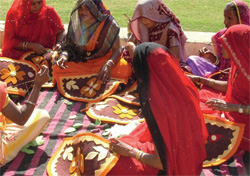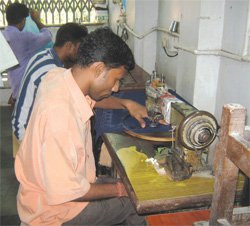Is RPL a Myth in India?
Workers with few, or no formal qualifications are most vulnerable in securing decent employment. By formally recognising workers' skills, Recognition of Prior Learning is seen as a means of creating a level playing field in order for them to gain opportunities for further learning and to improve career prospects
By Mamta Srivastava & S S Jena
 Open and Distance Learning need to address issues on how to standardise competencies within the broad framework of RPL for placing a comprehensive educational system
Open and Distance Learning need to address issues on how to standardise competencies within the broad framework of RPL for placing a comprehensive educational system
The role of RPL as a means of facilitating participation in formal education and training is often highlighted. However, in India no documented studies have examined the practice of RPL in the workplace, or otherwise, despite its potential contribution as a means of enhancing employability, labour mobility and career prospects.
 The need for giving emphasis on skill development, especially for the less educated, poor and out of school youth has been highlighted in various fora. The skill level and educational attainment of the work force determines the productivity, income levels as well as the adaptability of the working class in changing environment. Large percentage of population in India is living below poverty line. One of the important causes is lower percentage of skilled persons in the workforce.
The need for giving emphasis on skill development, especially for the less educated, poor and out of school youth has been highlighted in various fora. The skill level and educational attainment of the work force determines the productivity, income levels as well as the adaptability of the working class in changing environment. Large percentage of population in India is living below poverty line. One of the important causes is lower percentage of skilled persons in the workforce.
Those workers who acquired skills predominantly on the job or through other activities are often disadvantaged in gaining access to formal education and training, or in securing employment which adequately reflects their skills and experience. Workers with few, or no, formal qualifications are most vulnerable in securing decent employment due to absence of opportunity both vertically and horizontally.
By formally recognising their skills, RPL is seen as a means of creating a level playing field in order for them to gain opportunities for further learning and to improve career prospects. Recognition of skills can contribute much to the self-esteem and motivation of workers. For the growing enterprises, a better recognition of workers skills is a way to overcome skills shortages and match skills demand with supply. It can also provide an opportunity to improve the overall skill level and work performance of an industry.
In India, skill development at present is taking place mostly in the informal way, i.e. persons acquire skill at the work-place when they help their parents, relatives and employers etc. and such skills get transferred from one generation to another.
However, as been observed often, such persons do not have a formal certificate and thus earn lower wages and are exploited mostly by their employers. They have come through informal system due to socio-economic circumstances of the family and the compulsions of earning a livelihood rather than attending a formal course. While their productivity is low, their contribution to the national GDP cannot be ignored.
It is in this context that there is a growing demand to create a system of certification, which not only recognises their skills but also provides education and training in a mode that suits their economic compulsions. It will not only benefit the workforce to earn a decent living but also contribute to the national economy by better productivity of this workforce.
What Open and Distance Learning should do?
The ODL need to address issues on how to standardise the competencies within the broad framework of RPL for placing a comprehensive educational system, a clearly defined qualifications framework linked to occupational standards, and a sufficient resource capacity to administer the system and ensure quality. For this, the system needs to draw emphasis on several aspects.
These include an established framework of credit, qualifications and/or occupational standards and awareness among employers, practitioners and candidates. Autonomy for providers to develop their own system according to target group, needs and resources are also to be looked into.
Rigorous assessment processes to ensure quality and clear, jargon-free information to the learner is also required. Sufficient resources and investment in the skills of practitioners and assessors will be required to administer the system. There is a need for recognition of, and investment in, skills needed by applicants to access an RPL process.
The major concern in the context is the absence of a well laid down Vocational Qualification Framework in India and how the competencies and the skills be graded. The question of equivalency also needs to be addressed. Awareness among employers is another issue, which needs to be addressed consistently.
The Challenges
As has been observed, majority of the workforce are in unorganised sectors in India and those are the workforce that possess skills required for a particular job. Hence, there is a huge challenge in identifying where skills exist, communicating to potential candidates, and administering the process, is immense, including low levels of literacy and numeracy among potential candidates. Also, RPL is expensive (as mentioned in documents of other countries), yet should be less expensive than training. In developed countries, RPL has tended to incur costs for learners. Cost could be reduced by streamlining processes, using online support, and workshops for candidates.
There have to be clear indications of who is required to pay for what, and when. A nominal charge May help adult learners value the process. In many countries, outcomes are linked to occupational standards rather than curricular structures, leading to a lack of connectivity with further education and a mindset that a certificate of recognition is an end rather than a means to further development. Developing a critical linkage between the practitioners and the trainers in the context of the RPL is required. Record keeping and its updation is the real challenge for the certification. Establishing relationship with the skills and requirement in certification in a graded system and establishing the relationships between RPL, and regular assessment process, within a broad, flexible framework for assessment are the other areas of concern.
Qualifications are regulated because the public – learners, employers and others who use qualifications – want qualifications that are appropriate, of high quality, valued and respected by others in the community and understood by those who take them and use them. Can RPL fit into this framework of traditionally defining the qualification framework needs to be seen in the context.
|
Dr. S S Jena |
Dr. Mamta Srivastava |





















